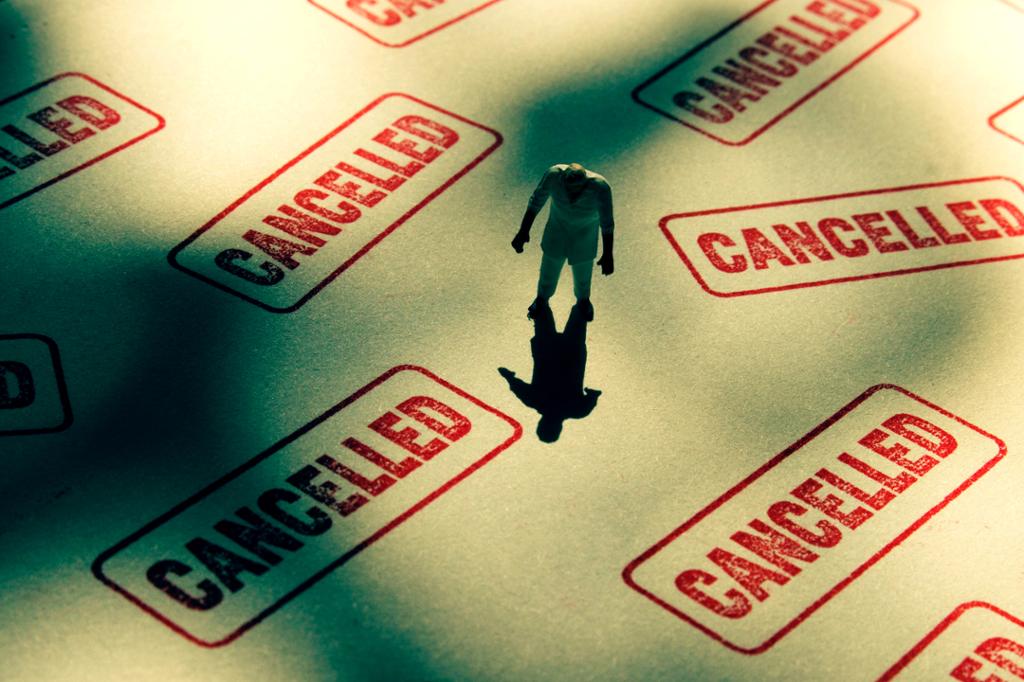Cancel Culture

Cancel culture is when someone is ostracised from their professional or social circle through social media. The person or company is perceived to have said or done something wrong, and people on social media wish to punish them. Sometimes it helps to publicly apologise for the transgression, but often people will hold on to their initial feeling of outrage, and not forgive. This can have serious consequences for a person's career or a company's profit.
The desire to name and shame those who have transgressed the public sense of right and wrong is nothing new, but the internet makes it easy to communicate with the people who have done wrong and expose what they did to the world.
People get addicted to feeling offended all the time because it gives them a high; being self-righteous and morally superior feels good.
Mark Manson
The positive side to cancel culture is that it holds people to account for morally questionable things they have said or done. These are often things that are not illegal, but merely perceived as immoral or out of touch with today's social norms.
Social media has given vulnerable individuals or groups a new way to challenge and address those who wrong them. They can tell their stories, find support and overcome bigotry and prejudice. The possibility to garner widespread support means they no longer have to suffer in silence.
Cancel culture is often linked to political correctness. According to Oxford Languages political correctness is: "the avoidance of forms of expression or action that are perceived to exclude, marginalise, or insult groups of people who are socially disadvantaged or discriminated against." Political correctness is in other words the desire to avoid hurting vulnerable groups.
Political correctness is not the same as cancel culture, but if people say things or behave in ways that are seen as politically incorrect they may face public condemnation and the threat of being cancelled.
Several famous comedians have said that cancel culture and political correctness make their jobs harder, but on the other hand few people regret that racist, misogynist, and homophobic humour has been pushed out of the mainstream. In the past comedians could get a laugh making fun of people with disabilities; today most would find that unacceptable.
Sometimes people who are cancelled have committed crimes. In connection with the #MeToo movement we saw many victims of sexual abuse name and shame perpetrators on social media. Some of these cases were investigated by the police, leading to criminal trials and convictions.
Deplatforming, also called no-platforming, is a form of political activism where the goal is to prevent someone who holds views and opinions the activists disagree with from being allowed an audience. This can happen in the form of demanding that the person's account on social media is shut down, by protesting invitations to speak at universities, by demanding that the person in question lose their job, and more. There is also financial deplatforming where banks or financial institutions refuse to offer services to persons or groups because of their views or actions.
Especially in schools in the U.S. there has been much debate about what material should be allowed. Is it OK for a Christian school to skip material that explains evolution? Is it OK to avoid literature if actions, words and phrases used are considered offensive to today's audience? Many schools, colleges and universities err on the side of not offending their students, and ban books from the curriculum if they are controversial. Examples of books that have been banned by some U.S. schools are Uncle Tom's Cabin by Harriet Beecher Stowe, Tom Sawyer by Mark Twain, Twelfth Night by William Shakespeare, Harry Potter and the Philosopher's Stone by J.K. Rowling, and The Diary of a Young Girl by Anne Frank.
Teachers and professors who have used material, words and phrases perceived to be offensive have been shamed on social media, put before disciplinary boards, and have in some cases lost their jobs.
There are two ways to choke off free expression. We've already discussed one of them: clamp down on free speech and declare some topics off-limits. That strategy is straightforward enough. The other, more insidious way to limit free expression is to try to change the very language people use.
Dennis Prager
Abusers and rapists have been tried and convicted. Comedians have been fired from comedy shows. Actors have been removed from TV shows or films. Artists have experienced a dip in sales of albums and concert tickets.
On the other hand, many have received a lot of support from fans who see the demand to cancel as meaningless or exaggerated, and for most the negative press blows over, and does no lasting harm.